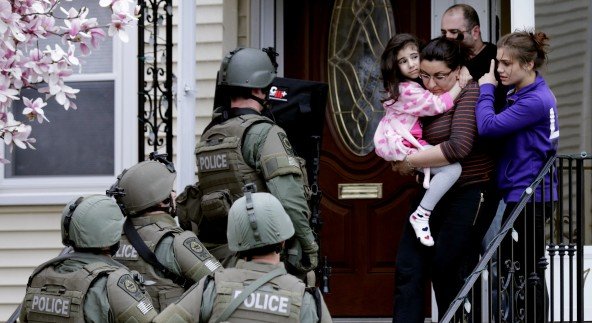Writing Our Way Through The Terror
 A woman carries a girl from their home as a SWAT team searching for a suspect in the Boston Marathon bombings enters the building in Watertown, Mass., Friday, April 19, 2013. (Charles Krupa/AP)An author friend writes a tribute to his country on his Facebook page. A stay-at-home mom, guarding her bevy of children, becomes a citizen reporter on the scene in Watertown, tweeting about the view from her backyard of snipers staking out a position on the roof of her garden shed. An otherwise non-aspiring writer is inspired to try his hand at capturing his version of this past week’s dreamy miasma of exhausting, hand-wringing events.
A woman carries a girl from their home as a SWAT team searching for a suspect in the Boston Marathon bombings enters the building in Watertown, Mass., Friday, April 19, 2013. (Charles Krupa/AP)An author friend writes a tribute to his country on his Facebook page. A stay-at-home mom, guarding her bevy of children, becomes a citizen reporter on the scene in Watertown, tweeting about the view from her backyard of snipers staking out a position on the roof of her garden shed. An otherwise non-aspiring writer is inspired to try his hand at capturing his version of this past week’s dreamy miasma of exhausting, hand-wringing events.
As we Boston-area residents have been recovering from the Boston Marathon bombings, the lockdown, and from our media hangovers, out gushed the words, like a fresh wound. Not spoken words, which can evaporate as soon as they are voiced. But stories, written down.
Sure, we’ve all experienced the flurry of hastily dashed-off texts, sent to loved ones to check in, to say, “We are safe.” But even before the dust settled on Boylston Street, I’d noticed a burst of blog posts, Facebook posts, and other personal accounts popping up on the Internet. Those longer stories that cannot be contained in a mere tweet.
All these written words prove our need to find our place within the events. To be part of the story, to insert our own heart and mind into this larger narrative. Who doesn’t want to comment, to communicate, to reflect, to engage in some way? Or, as Neil Diamond himself belted out at Fenway Park, to use words as, “Hands, touching hands / Reaching out, touching me, touching you”?
This urge to participate and to tell one’s individual story humanizes pain and makes big, sweeping events human-scaled. The tradition is as old as Homer and the Icelandic Sagas. We cope with trauma by injecting ourselves into the wider story. The gesture says, “I, too, was there.” The gesture also says, “This is how I process grief.” Story helps transform chaos, crisis, and helplessness into something we can retell, and therefore transcend.
Read the rest of my commentary "Writing Our Way Through The Terror" for NPR affiliate WBUR